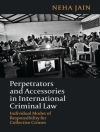Now available as an e Book for the first time, this 2006 book from the Melland Schill series considers the main legal issues concerning the use of force by international organisations and states. It assesses the achievements and failures of the United Nations‘ collective security system, and discusses the prospects ahead. It also deals with the use of force by states in self-defence and on other legal grounds.
The book discusses to what extent the rules on the use of force have evolved since the end of the Cold War in order to meet the needs of the international community. It focuses in particular on the military operations directed against terrorism and weapons of mass destruction. The research is developed from the standpoint of the sources of international law. It rejects a static vision of the rules on the use of force, including those enshrined in the UN Charter. Rather, it highlights the interaction between conventional and customary international law and the exposure of both sources to state practice.
Inhaltsverzeichnis
Introduction
PART I: THE COLLECTIVE USE OF FORCE
1. The collective security system established by the Charter
2. The collective security system in practice
3. The attempted dismantling of the collective security system
PART II: THE INDIVIDUAL OR JOINT USE OF FORCE
4. Self-defence and other forms of unilateral use of force
5. The international fight against terrorism and the proliferation of weapons of mass destruction
Über den Autor
Tarcisio Gazzini is Lecturer in International Law at the University of Glasgow












